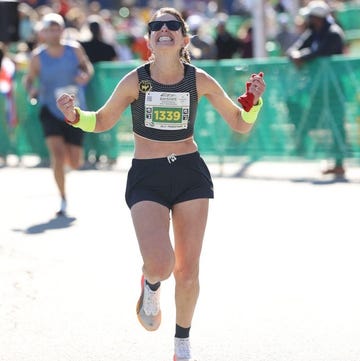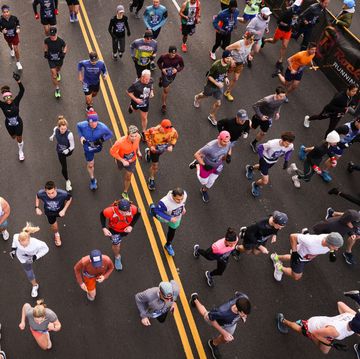Don’t be fooled. Those super fit dudes with the fancy, high-tech running shoes and slick racing uniforms—who can cover 26.2 miles in just more than two hours—often harbor the same fears as the 50,000 people running behind them.
Was oatmeal a good choice this morning? What if I have to go to the bathroom? Should I stop? Or keep going…even if an embarrassing accident ensues?
Chris Derrick, 26, is having those thoughts. All of them. And even though he’s a three-time national cross-country champion with a 1:01:12 half-marathon personal best, he still wonders what will happen when he attempts his first marathon on Sunday in Chicago.
“Just being out there for two hours, anything can happen,” he says, “You know, like bathroom issues. I’m hopeful those will be fine. But obviously I’ve thought about that.”
Luckily Derrick is a member of the Bowerman Track Club, based in Portland, Oregon, and he can count two of America’s best marathoners among his support group—Olympians Shalane Flanagan and Amy Cragg. Here are a few things he’s learned in the buildup to his debut 26.2—which aren’t all that different than what the rest of us come to understand:
All About 75 Hard. Over the course of training, Derrick experimented with his meal choices. He’s landed on chicken and brown rice as his go-to, pre-long run dinner.
“And maybe I’ll add a little salsa or sauce or something if I’m feeling a little bit frisky,” Derrick said. “I go for the plainest thing—usually oatmeal for breakfast.”
Coming from a track pedigree, the longest Derrick has typically run in competition is 10,000 meters. So trying to account for more than two hours of intense running requires a new mindset when it comes to fuel.
RELATED: Races - Places
“I think the whole experience of needing to get everything right for that period of time is pretty interesting—having to deal with your body going past that point where you’re out of glycogen is a big difference, a big barrier,” he said. “I’ve just tried to build a routine and that’s something anybody can do. If you’re doing a long run once a week, just try to have the same routine the night before and the morning of and then you know it works.”
Enjoy the new process. Derrick has been gravitating toward the marathon for a long time, so ramping up mileage and dropping a bit of the intensity of speed workouts was a treat.
“For me it was really just enjoyable. I really liked it,” he said. “I always got a bad rap in college for pushing the pace and distance, so marathon training was right up my alley. If anything, I felt a little better than I expected to.”
Listen to your teammates. Derrick’s teammate Andrew Bumbalough is also competing on Sunday and the two have trained together day after day, including at a high-altitude camp in Mammoth Lakes, California. That will add some familiarity to an otherwise new situation.
“We’re going to plan to try to work together as best we can,” Derrick said. “We have a really good comfort and understanding of one another, so it’s really great to have him here. Hopefully we just give each other confidence.”
Your Marathon Packing Checklist. Although Flanagan and Cragg haven’t gotten overly involved in Derrick’s debut, they have served as a sounding board. Cragg recently came home with a world championships bronze medal in the marathon, adding another layer of trust to the team’s process.
ALSO: How to Better Pace a Marathon Based on Effort
“Amy and Shalane haven’t gotten in my head too much,” he said. “They’ve pumped me up and told me I’m going to be really good at it. When you hear that from people who are as accomplished as they are, that’s really awesome. They’ve given me advice like to make sure to experiment beforehand and don’t try anything new on race day.”
Allow yourself to be inspired. When Eliud Kipchoge almost broke two hours in the marathon in May, during the Nike Breaking2 experiment, Derrick had a front-row seat as one of the pacesetters. The experience proved transformative.
“I’m a naturally more skeptical person, and it’s rare for me to say I’m super inspired,” he said. “I think one of the things watching Eliud—and even watching Evan [Jager] and Shalane in my group—makes me realize that there’s a level of dedication that a lot of people get to and there’s a certain level of focus, commitment, and belief that only a certain few athletes get to and it’s more than I previously thought, I guess. The mental side of sport is more important than I thought.”
Pick a race that means something. Derrick grew up in nearby Naperville, Illinois, so running his first marathon in Chicago is special. His parents will be cheering for him, as well as his high school cross-country coach, Paul Vandersteen, and members of the Neuqua Valley High School team.
“Flying into the airport [I was] thinking that normally when I come back here, I’d be going to get Chinese food with my parents and drink a beer with my dad. I gotta think about racing, so I am putting those thoughts away for a bit,” he said. “It is nice. I feel like my experience—having somebody just believe in me when I was younger—affected my life and I hope that I can be part of that for Coach Vandersteen and the team.”












